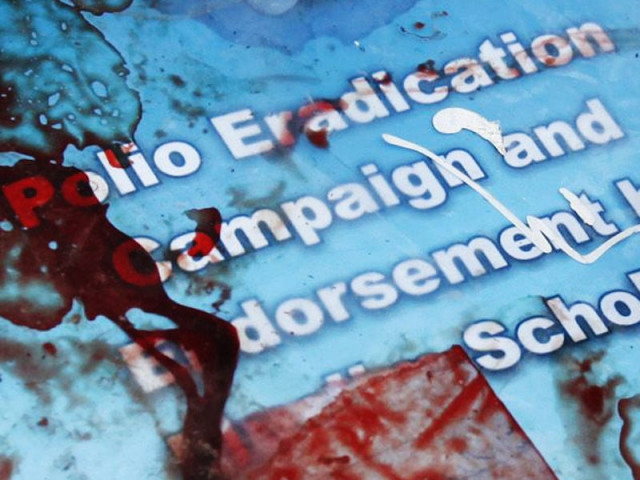Fallen foot soldiers: Silenced, not crippled by polio
Families of deceased polio workers in FATA recall horrific attacks.

For many of the numerous families of deceased health workers, security officials and drivers associated with the undying polio eradication campaign, the legacy is marred by regret and horror. PHOTO: REUTERS/FILE
For the ‘silenced’ polio workers of Pakistan, the end is often swift and unceremonious. There are no blazing obituaries or monuments, no swarm of weeping mourners at memorial services.
For many of the numerous families of deceased health workers, security officials and drivers associated with the undying polio eradication campaign, the legacy is marred by regret and horror.
The children of deceased campaign supervisor Zakia recall last moments with their mother, who was killed in December 2012. “Our loving mother made us breakfast and gave medicine to me and my father that day,” says eight-year-old Husnain. He adds that a nearby shopkeeper had informed him of an attack on a polio team in Shabqadar hours after his mother stepped out, and that when he rushed to the site with his father, Zakia was already dead.
The driver accompanying the team, Ayaz Khan, was also an unsuspecting victim of the brutal attack on the team on that ill-fated day. With two wives and seven children, he was also the only breadwinner in his family. His brother Muhammad Kareem, who shares a 10-marla house with Ayaz and three more brothers, doesn’t have money to build a boundary wall around their dilapidated home.
“He was a nice and religious person – he even performed his duty as the nearby mosque’s prayer leader in his absence,” says Ayaz’s uncle, an employee at a UNHCR office. “His monthly salary was around Rs7,000 and he had no other business to overcome his economic difficulty. He was a low-level employee at the health department who was waiting to become permanent, but was killed months before the order.”

At Ayaz’s simple funeral, relatives had wondered aloud how his family would survive after his death. As they prayed for his afterlife, mourners in hushed whispers comforted his only sister who had fallen unconscious when she saw Ayaz’s blood-stained clothes.
From Karachi to Khyber-Pakhtunkhwa and the Federally Administered Tribal Areas (Fata), the attacks on low-income health and security officials associated with the polio eradication campaign in the country have claimed 66 lives. Workers have been brutally killed during immunisation drives, and even in front of their homes.
In a recent campaign in Jamrud, a polio team came under fire but was fortunate enough to escape unharmed. During the same drive, three roadside bombs were defused by Bomb Disposal Squad (BDS) officials. In Islamabad, polio workers have been harassed, and threatened through handwritten letters. But the risky participation continues – all for Rs250 a day for a three-day campaign. A plan, however, is under way whereby the government will compensate the victims’ families with Rs 500,000 each.
Senior Vice-President of the Paramedical Association in K-P, Khan Mir Mulagori likens the participation of these officials to riding on the back of a lion; it may be considered brave, but workers that partake in the campaign are incessantly haunted by the hazards of the low-paying trade.
“Every worker operates under the shadow of death as they are prone to any type of attack,” Mulagori says. He pointed out that some workers resigned from the job when there was a sudden upsurge in attacks last year.
Despite the threat of militancy, Fata and K-P have made measured success. Of the seven agencies in Fata, no cases have been reported so far this year from Orakzai, Mohmand, Bajaur and Kurram. Locals say jirgas are held before each polio drive, in which tribal elders assure polio workers of their cooperation.
Haji Pervaiz Khan, a tribal elder whose son, security guard Taufeeq Afridi was killed in a blast targeting a polio team in the Lashora area said, “Perhaps polio doesn’t affect as many children as [attacks kill] security forces.”
The Pakistan Army in late April said it will provide security to polio teams set to work in North and South Waziristan agencies – the most volatile parts of Fata where no immunisation has taken place since 2012.
“After seeing the enormity of the situation, the army voluntarily stepped forward to offer its services the way it has always done during natural calamities,” a security official on condition of anonymity said. He added that the prime minister later formally requested that the army help to provide security to vaccination teams.
Published in The Express Tribune, May 24th, 2014.













COMMENTS
Comments are moderated and generally will be posted if they are on-topic and not abusive.
For more information, please see our Comments FAQ